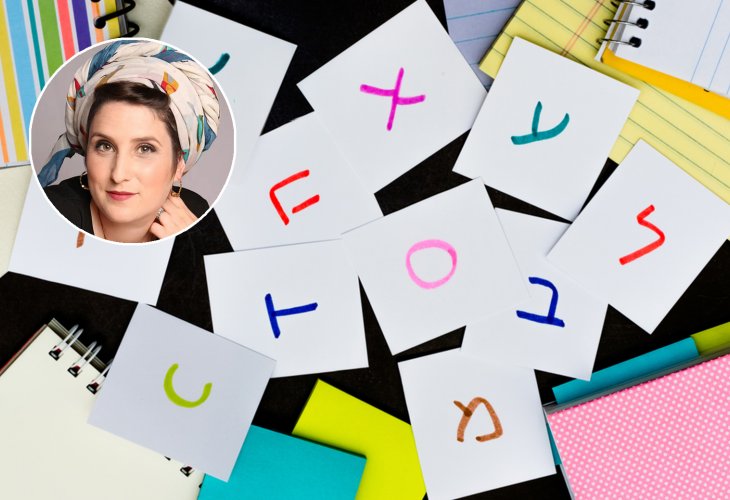Hadas Margolis in a Candid Interview: "In Fourth Grade, I Started to Identify Letters. Today, I'm a Parent Coach and Personal Trainer"
Hadas Margolis couldn't read or write until sixth grade and was ostracized by her classmates. What gave her the strength to continue? And where did she grow from all this?
 In the circle: Hadas Margolis (Photo: Shutterstock)
In the circle: Hadas Margolis (Photo: Shutterstock)If you had asked young Hadas Margolis if she believed she would become something, she would likely have said "no." “Over the years, the understanding that I'm stupid, worthless, uninteresting, and undeserving of good things solidified inside me,” she says. "It started in first grade and continued throughout my schooling. Extreme difficulties, both academic and social, with ups and downs. I had attention deficit disorder, dyslexia, and various learning disabilities, on top of a social ostracism I experienced over the years." Despite this burden, she trudged to school each morning for another tough day. Only her parents weren't fazed and continued to see the good in the treasure they received. Years passed, and the girl who couldn't read or write became a parental coach and personal trainer for struggling girls.
Cartwheeling Under the Desk
Hadas's academic struggles were immediately apparent. "I couldn't sit for more than a few minutes on a chair," she describes. "Years later, my sister told me she used to pass by my classroom and see me doing cartwheels under the desk. Even when I sat in class, I was absent, my mind was elsewhere. Academically - until sixth grade, I didn't know how to read. But the real issue was that I couldn't bring myself to be present. The need to be in class was beyond my strength. Even functionally, I struggled - waking up in the morning or maintaining my belongings in order. I remember teachers in first grade saying, 'If you don't do what you need to, we'll send you back to kindergarten,' and I - I dreamed of being sent back."
 (Photo: Shutterstock)
(Photo: Shutterstock)Did you receive any help over the years?
"My parents noticed the struggle early on, but it took time to really help me. They tried different directions but in the past, there wasn't as much comprehensive support as there is today. When I was in second grade, they insisted on Ritalin, but it didn't help. The teacher insisted that I didn't have a problem. So I fell between the cracks until I got remedial teaching in fourth grade, where I started recognizing letters. During that time, they also managed to find the right Ritalin dosage for me, and while I didn't start listening in class, I was less disruptive. In sixth grade, I could read short stories and took my first oral test in my life. Suddenly, I scored 100 on a test, discovering that I had a chance. That was a small light in a big darkness."
Socially, Hadas faced challenges as well. "I was hyperactive, impulsive, and not always easy to get along with, thus becoming an ostracized child. The trigger for the ostracism was the fact that I defended teachers. My mother was a teacher, so whenever the girls planned something against them - I spoiled their plans. At some point, my mom actually begged me not to intervene in what was being done to the teachers, just so they'd stop ostracizing me."
How did you cope without friends?
"I played in the afternoons with younger kids, which gave me confidence. I also remember very unfair friendships, like a friend who would be with me when it was convenient for her and told me not to come when she was busy with others. In class, I recall never having pencils, as I used to lose all of them, and nobody wanted to lend me any. There was just one girl who looked after me and made sure I was okay. When I lacked a pencil, she lent me one and ensured I returned it. I haven't forgotten her loving attitude toward me even today - she too was like a ray of light for me in the darkness of that time."
Blessed Hyperactivity
Nevertheless, numerous challenges did not extinguish Hadas's natural joie de vivre. "I had a rich inner world, loved to act, and even after experiencing hardship, I quickly returned to a state of joy," she says. "The most significant thing for me was the stable anchor my parents gave me. They weren't shaken by the situation, and the fact that I didn't succeed academically didn't define me in their eyes. The empty report cards I brought from school meant nothing, and they saw academic difficulties as temporary. I remember a saying my mom told me, that today I know how true it is. She said, 'In school, hyperactivity is a massive challenge, but later in life, it'll be a blessing for you, because you need a lot of strength out there.' Throughout, my parents maintained a separation between the good in me and all the difficulties and battles that were part of my portion, and even though I didn't make life easy for them, they continued to support and trust me. Their optimism sometimes seemed detached from reality, but they held the inner core of who I really am, and so, deep down, I could hold it too."
Towards high school, Hadas moved to a school tailored for students with difficulties. "I came to an institution that had a less positive reputation, due to the complexities that reached its doorstep. However, I was excited about the thought that I would finally be equal among equals, with all my learning disabilities. The truth is, even there, I was an anomaly in terms of academic challenges, but it was the first place that managed to handle my difficulties. Gradually my grades began to rise, and all the negative beliefs I had about myself started to crumble. Until that day, I told myself that I was stupid and unsuccessful, but suddenly I began to question - 'Am I stupid? Am I unsuccessful?' The seed of trust my parents planted started to sprout, yet I still had a long way to go."
The path Hadas went through had ups and downs. "I wanted very much to replace the question marks that formed in my mind with exclamation marks - to be sure that I was good," she describes. "I launched a stubborn fight to prove I could, occasionally also getting angry and fighting against the system, even though they were there to help and support. Regarding learning - my disability led to the fact that it wasn't always evident that I had put in effort, there were times I crammed for a test and got 50. I would then lock myself in the bathroom, cry for half an hour, and then come out and write on two whole pages 'I will succeed, I will succeed.' It was clear to me that I had to finish with a diploma, and I refused to give up. There were days when I took 4 Ritalin pills - one every 4 hours, just to focus and study. One of the teachers approached my parents with concerns that I was becoming addicted to the medication, it was indeed a bit of a combative struggle."
 (Photo: Shutterstock)
(Photo: Shutterstock)Hadas’s struggle also led to religious confrontation. "Throughout my teenage years, I still sought approval and love from outside, and external appearance became significant to me. There was also some anger and question marks towards Hashem - why is He leading me on a path that hurts me so. Keeping the commandments started feeling heavy and restricting, and I began to look for myself in other places."
However, the inner connection was not severed. "I always walked with the sense that Hashem is with me, and something inside me knew that even when He hurts me - He wants my good. My parents, for their part, tried to set boundaries for me, but they tried to do it respectfully, and they never engaged in a war against me. Therefore, even when I went with my desires, it was crucial for me to respect them. It was far from simple and didn't look rosy at all, but that’s what could eventually lead to change."
Returning Inward
Amidst the sea of battles Hadas waged, there were bright spots. "I had a remedial teacher who would sit with me for hours. Before exams, for example, she read them with me just to help me organize the questions. Without her help, I wouldn't have understood what it was about. Years later, she said to me with a smile: 'Every time you entered the room, it needed to be sprayed with Ritalin.'"
Once Hadas began to believe in herself, a social change also occurred. "Something inside me straightened up, and I realized I deserved a different treatment," she says. "I stopped the unfair friendships and started looking around to see what new relationships I could create. At that time, some new immigrants from America came to the town I grew up in, they spoke English and I Hebrew, but we managed to communicate through stammering and hand gestures. Over time, a healthy and loving relationship developed there, and later more girls joined, those who needed this supportive place."
Over time, the renewed connection to holiness arrived. "I felt how the need for external approval left me empty, and I found myself talking a lot with Hashem, especially after going out with friends. I realized that what truly filled me was the internal connection - to my heart, to Hashem, to the people truly close to me. At a certain point, I started learning at a women's seminary, and slowly I felt I was returning to a healthy relationship with myself and with Hashem. There was a rabbi who repeatedly said that we came to the world to delight in Hashem, and I argued with him a lot - what pleasure is he talking about? Let him see what I went through. Eventually, I agreed he was right, understanding that the upheavals I went through carried flavor and meaning. So, when my opposition and anger subsided, something inside me opened up. I started doing things that filled me internally, and no longer needed external approval. Even the Jewish law no longer seemed limiting, but a path to elevate me to Hashem. This process of turning inward gave me a lot of calm, a bit like the Ritalin I used to receive back then."
Looking back on all that you've been through, what do you have to say?
"It wasn't an easy path, and it still affects me today, like the whole issue of order and organization remains challenging for me. Even for my degree studies, I received a disability percentage from the National Insurance Institute. On the other hand - I gained strengths - of movement, of creation, of the ability to constantly develop new things, and once I started directing them to the right place - immense growth occurred. Precisely the path I went through led me to help girls today who are in similar situations. I am a personal coach for girls in a state of covert dropout, those who are still within the framework but are facing significant academic, personal, or social challenges. Who better than me to understand the path they are on, and yet - to see the good seed within them? And from this good, help them find the way to grow."

